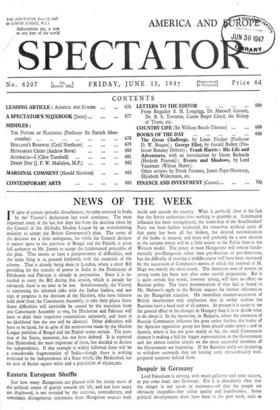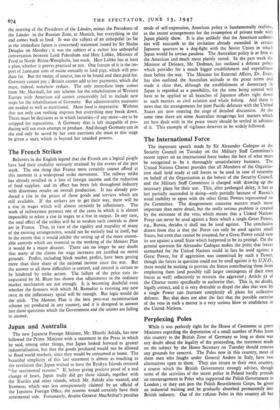Despair in Germany
Lord Pakenham is striving, with much gallantry and some success, to put some heart into Germany. For it is abundantly clear that the danger is not revolt or resistance—of that the people are obviously incapable—but rather apathy and hopelessness. Some political developments there have been in the past week, such as the meeting of the Presidents of the Lander, minus the Presidents of the Lander in the Russian Zone, at Munich, but everything in the end comes back to food. It was the subject of an unhopeful (as far as the immediate future is concerned) statement issued by Sir Sholto Douglas on Monday ; it was the subject of a rather less unhopeful conversation between Lord Pakenham and Herr Liibke, Minister of Food in North Rhine-Westphalia, last week. Herr Lubke has at least a plan, whether it proves practical or not. One feature of it is the im- port of 2,000,000 tons of maize annually to feed pigs, which will pro- duce fat. But the maize, of course, has to be found and then paid for. Germany cannot pay ; Britain cannot add to her payments, which she must, indeed, somehow reduce. The only immediate hope comes from Mr. Marshall, for any scheme for the rehabilitation of Western Europe with American aid cannot conceivably fail to include new steps for the rehabilitation of Germany. But administrative measures are needed as well as nutritional. More food is imperative. Without that not only can nothing improve but everything may break down. There must be decisions as to which factories—if any more—are to be stripped for reparations. A Germany that is left incapable of pro- ducing will not even attempt to produce. And though Germany can in the end only be saved by her own exertions she must at this stage be given a start, which is beyond her unaided powers.



































